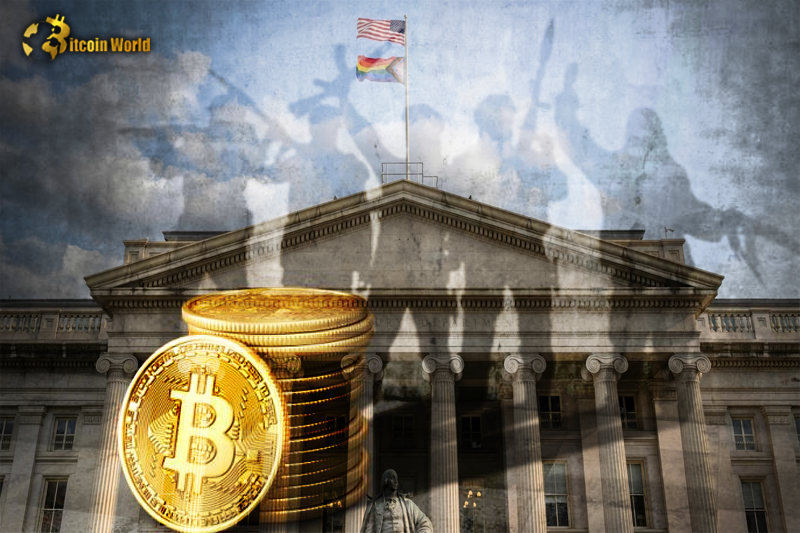In a significant move highlighting the growing scrutiny over cryptocurrency’s role in illicit activities, the U.S. Treasury Department has recently sanctioned a cryptocurrency operator based in Gaza. This action, targeting ‘Buy Cash Money and Money Transfer Company,’ alleges links to Hamas, a group already under intense international scrutiny. But what exactly happened, and what does it mean for the world of crypto and the fight against terrorism? Let’s dive into the details.
What’s the Headline? US Treasury Targets Gaza-Based Crypto Exchange
The core news is that on October 18th, the U.S. Treasury Department’s Office of Foreign Assets Control (OFAC) announced sanctions against a virtual currency exchange operating out of Gaza, named ‘Buy Cash Money and Money Transfer Company,’ and its operator, Khan Yunis. This action comes in the wake of the recent attacks on Israel and is aimed at crippling Hamas’s financial networks.
Key Takeaway: The US Treasury is cracking down on cryptocurrency businesses it believes are aiding terrorist groups like Hamas.
Why ‘Buy Cash Money and Money Transfer Company’?
According to the Treasury, ‘Buy Cash Money and Money Transfer Company’ and its operator are accused of facilitating fund transfers for not just Hamas, but also other terrorist organizations including ISIS and an al-Qaeda affiliate. This isn’t just about small amounts; blockchain analytics firm Elliptic reported that over $25 million in Bitcoin (BTC) and Tether (USDT) has flowed through this firm since 2015, linked to these groups.
Key Points:
- Accusation: ‘Buy Cash Money’ allegedly provided services to Hamas, ISIS, and Al-Qaeda affiliates.
- Scale: Over $25 million in crypto transactions linked to these groups since 2015.
- Location: The exchange is based in Gaza, and its operator is identified as a resident of Gaza.
OFAC and the Sanctions: What Does it Mean?
OFAC, the Office of Foreign Assets Control, is the Treasury Department branch that enforces economic and trade sanctions. Being placed on OFAC’s list of Specially Designated Nationals (SDNs) is a serious matter. It essentially means:
- Asset Freeze: Any assets the designated entity or individual holds within US jurisdiction are frozen.
- Prohibition: US persons are generally prohibited from dealing with sanctioned entities.
- Global Impact: While US-centric, these sanctions often have a global ripple effect, as international businesses tend to avoid dealing with sanctioned entities to maintain access to the US market.
In this case, the sanctions target both ‘Buy Cash Money’ and its operator, Ahmed M.M. Alaqad, aiming to cut off their financial pipelines and prevent them from further aiding Hamas.
Janet Yellen’s Stance: A Firm Message
Treasury Secretary Janet Yellen’s statement underscores the seriousness of these actions: “We will continue to take all steps necessary to deny Hamas terrorists the ability to raise and use funds to carry out atrocities and terrorize the people of Israel… That includes imposing sanctions and collaborating with allies and partners to track, freeze, and seize any Hamas-related assets in their jurisdictions.”
Yellen’s Message Highlights:
- Commitment: The US is determined to stop terrorist financing.
- Scope: Sanctions are a key tool in this fight.
- Collaboration: International cooperation is crucial to track and seize assets.
The Broader Picture: Crypto, Terrorism, and Regulation
This sanction is not an isolated event. It fits into a larger narrative of increasing regulatory scrutiny over cryptocurrency, particularly concerning its potential use in illicit finance. Here’s why this is significant:
- Crypto’s Perceived Anonymity: While not entirely anonymous, cryptocurrencies can offer a degree of pseudonymity that can be attractive for those seeking to move funds discreetly.
- Borderless Transactions: Crypto transactions are inherently cross-border, making it challenging for national authorities to regulate and control them.
- Growing Regulatory Focus: Governments worldwide are increasingly concerned about the use of crypto for money laundering, terrorist financing, and sanctions evasion.
The US Treasury has been actively using sanctions against crypto entities involved in illicit activities. Just weeks before this Hamas-related sanction, on October 3rd, they targeted crypto wallets linked to China-based chemical manufacturers involved in fentanyl production. This demonstrates a consistent approach to using financial tools to combat various forms of illicit activities involving crypto.
What Does This Mean for the Future?
The sanction against ‘Buy Cash Money’ sends a clear message:
- Increased Scrutiny: Crypto exchanges, especially those operating in regions with geopolitical instability or lax regulatory frameworks, will face heightened scrutiny.
- Compliance is Key: Crypto businesses must prioritize robust compliance measures, including Know Your Customer (KYC) and Anti-Money Laundering (AML) protocols, to avoid falling foul of regulations and sanctions.
- International Cooperation: Expect greater international collaboration in tracking and disrupting illicit crypto flows.
- Evolving Regulations: The regulatory landscape for crypto is still evolving. These actions may spur faster development and implementation of stricter regulations globally.
In Conclusion: Crypto’s Crossroads
The US Treasury’s sanction against the Gaza-based crypto exchange highlights a critical juncture for the cryptocurrency world. While crypto offers numerous legitimate benefits, its potential for misuse in illicit finance, including terrorist financing, is a serious concern for regulators. As governments worldwide grapple with how to manage this technology, expect to see continued and potentially intensified efforts to regulate and sanction crypto entities that facilitate illegal activities. This case serves as a stark reminder that the crypto space is not beyond the reach of international law and that compliance and transparency are becoming increasingly non-negotiable.
Disclaimer: The information provided is not trading advice, Bitcoinworld.co.in holds no liability for any investments made based on the information provided on this page. We strongly recommend independent research and/or consultation with a qualified professional before making any investment decisions.




